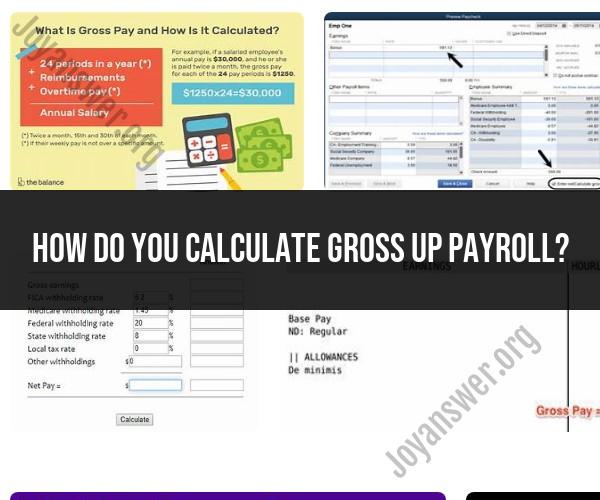How do you calculate gross up payroll?
Calculating gross up payroll involves adjusting an employee's net pay to ensure that they receive a predetermined gross (pre-tax) amount. This is commonly done when an employer wants to cover an employee's tax liabilities on certain types of compensation, such as bonuses or fringe benefits. Here's a step-by-step guide on how to calculate gross up payroll:
Step 1: Determine the Desired Gross Amount:
- Start by determining the gross amount you want to provide to the employee. This is the amount you want them to receive before any taxes or deductions.
Step 2: Calculate the Estimated Tax Liability:
- Estimate the total tax liability on the desired gross amount. This includes federal income tax, state income tax (if applicable), and FICA (Social Security and Medicare) taxes.
Step 3: Calculate the Grossed-Up Amount:
To calculate the grossed-up amount, you'll need to use the following formula:
Grossed-Up Amount = Desired Gross / (1 - Tax Rate)
- "Desired Gross" is the gross amount you determined in Step 1.
- "Tax Rate" is the estimated total tax rate (expressed as a decimal).
Step 4: Determine the Tax Rate:
The tax rate is the total tax liability as a percentage of the desired gross amount. To calculate the tax rate, use the following formula:
Tax Rate = (Tax Liability / Desired Gross) * 100
- "Tax Liability" is the estimated total tax liability from Step 2.
- "Desired Gross" is the gross amount from Step 1.
Step 5: Calculate the Tax Amount:
Determine the tax amount that needs to be withheld from the grossed-up amount. To do this, subtract the desired gross amount from the grossed-up amount:
Tax Amount = Grossed-Up Amount - Desired Gross
Step 6: Prepare the Payroll:
- When processing payroll, you'll pay the employee the grossed-up amount calculated in Step 3.
- Withhold and remit the estimated tax liability determined in Step 2 on behalf of the employee.
Step 7: Report Gross and Net Amounts:
- On the employee's pay stub or earnings statement, report both the grossed-up gross amount (before taxes) and the net amount (after taxes) that the employee will receive.
It's important to note that grossing up payroll can be complex due to variations in tax laws, deductions, and exemptions. Therefore, it's advisable to consult with a payroll specialist or tax advisor to ensure accuracy and compliance with tax regulations. Additionally, grossing up payroll may have tax implications for both the employer and employee, so it's essential to understand these implications before proceeding.
Grossing Up Payroll: How to Calculate Gross Pay for Employees
Grossing up payroll is the process of increasing the gross pay of an employee to offset the amount of taxes that will be withheld from their paycheck. This is typically done when an employer agrees to pay an employee a specific net amount, such as a bonus or relocation expenses.
To calculate gross pay for an employee, you will need to know the employee's tax rate. You can find this information on the employee's W-4 form. Once you have the employee's tax rate, you can use the following formula to calculate their gross pay:
Gross pay = Net pay / (1 - Tax rate)
For example, if an employee is due a net bonus of $1,000 and their tax rate is 25%, then their gross pay would be calculated as follows:
Gross pay = $1,000 / (1 - 0.25) = $1,333.33
Gross Payroll Calculation: Determining Gross Salaries
Gross payroll is the total amount of money that an employer pays to its employees before any taxes or other deductions are withheld. To calculate gross payroll, you will need to add up the gross pay for all of your employees.
Once you have calculated gross payroll, you will need to withhold taxes and other deductions, such as Social Security and Medicare taxes. The amount of taxes and deductions that you withhold will depend on the employee's tax rate and the other benefits that they receive.
Ensuring Accurate Compensation: Grossing Up Payroll Explained
Grossing up payroll is important to ensure that employees receive the full amount of compensation that they are entitled to. When an employer agrees to pay an employee a specific net amount, such as a bonus or relocation expenses, they are responsible for ensuring that the employee receives that amount after taxes and other deductions are withheld.
By grossing up payroll, employers can ensure that their employees receive the full amount of compensation that they have agreed to pay them. This is important for maintaining morale and ensuring that employees are treated fairly.
Here are some examples of when an employer might gross up payroll:
- To pay an employee a bonus or relocation expenses.
- To pay an employee for overtime or unused vacation days.
- To pay an employee for a severance package.
- To pay an employee for a back pay award.
If you are an employer, it is important to understand the basics of grossing up payroll. This will help you to ensure that your employees are paid accurately and fairly.











